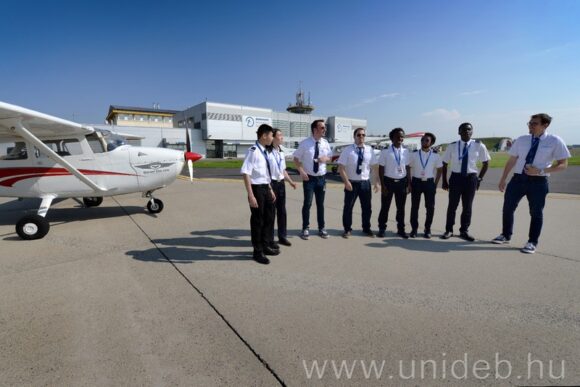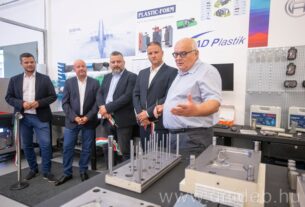The eight pilots – Jordanian, Kazakh, Kenyan, Hungarian, Mongolian, Turkish, and Ukrainian – who were the first in the history of the institution and the faculty to graduate after completing the “Professional pilot” training, received their diplomas at the ceremony of the Faculty of Technology of the University of Debrecen.
The solemn moment was preceded by a long story going back almost a decade. After consultations and negotiations, on September 19, 2014, Wizz Air signed a letter of intent with the Ministry of Foreign Affairs and Trade, the University of Debrecen, and Pharma-Flight Kft. to establish a pilot training institution for all those who envision their future in the field of aviation. Finally, in September 2018, the professional aircraft pilot basic training program started with 30 students, 28 Stipendium Hungaricum scholarship holders, 1 foreign student, and 1 self-funded Hungarian student.
During the accreditation process, the question arose as to whether 20-person classes could be formed? However, life refuted this suggestion, since the first year started with 30 students, and after that, the training continued with 50 people, the international popularity of which is proven by the fact that there are now several times the number of over-subscriptions for the course, which otherwise has strict entrance requirements,
– said the Gyula Győri is an honorary associate professor and head of the Department of Aeronautical Engineering of the Faculty of Technology of the University of Debrecen.
The first-year students came from South Korea, Egypt, India, Jordan, Kazakhstan, Kenya, Kosovo, Hungary, Moldova, Mongolia, Nigeria, Tanzania, Turkey, and Ukraine.
In the following years, the number of countries interested in the training continued to increase, as Azerbaijan, Bangladesh, Brazil, Japan, Yemen, Kyrgyzstan, Colombia, Kuwait, Laos, Pakistan, Serbia, Singapore, Thailand, Tunisia, and even students from the Cape Verde Islands increased the international palette of the University of Debrecen as students of the undergraduate program in aeronautical engineering.
During the seven-semester training course, the subjects include knowledge of the natural sciences, economics and the humanities, professional core material, and differentiated professional knowledge material.
During their studies, students must complete three mandatory flight exercises during the summer after the 2nd, 4th, and 6th semesters, but in addition, starting from the 3rd semester, they also complete daily flights during the diligence period, and then the practical exam at the end of the training they can obtain a professional service license.
Of course, prior to the launch of the course and since then, the training of trainers has been continuous, in the framework of which the trainers who undertook it were also given the opportunity to learn to fly an airplane and obtain an official license. Three people now have a professional service (PPL) license, among them Ailer Piroska, the vice chancellor for sector development responsible for the establishment of the DE mobility and vehicle industry training center, a professor at the Department of Aviation and Road Vehicles of the Faculty of Technology, and Géza Husi, the dean of the faculty and head of the department.
The aeronautical engineering – formerly professional aircraft pilot – bachelor’s degree program was the first course that the Faculty of Engineering launched specifically for the industry dealing with transport and goods transport. All of this entailed the training of other specialists in the aviation industry, so students in the technical manager’s bachelor’s and master’s programs specializing in aviation management, and in the vehicle engineer’s bachelor’s degree, students also study aircraft specialization. The faculty plans to introduce additional, newer training courses for the vehicle industry, including aviation,
– Géza Husi informed.
The dean also emphasized that the 7-semester training lasted 8 semesters for the current graduates due to the measures limiting practical flights caused by the pandemic and the war situation.
The faculty and the outsourced department did everything possible to ensure that the overall 9-month restriction meant only one-semester extension for the students. They were able to make up for the shortfall in the training of younger students
– emphasized Géza Husi.
The first pilots to graduate from the University of Debrecen received their diplomas at the faculty’s graduation ceremony on July 8, in the Dísudvara of the Main Building.
There is still great interest in the training, the number of applicants is constantly increasing, and the “Professional pilot” course is now four times oversubscribed.
There are currently 40 students studying in the program that started in 2019, and during last year’s admission procedure, the university admitted 60 students, and finally, 51 started the training.
The first graduates will soon be followed by another eight recently graduated pilots, who are expected to receive their diplomas at the University of Debrecen this September.
hirek.unideb.hu


















